- DCCA Home
- DCCA House Tour
- 1707 NH Avenue
1707 New Hampshire Avenue, NW
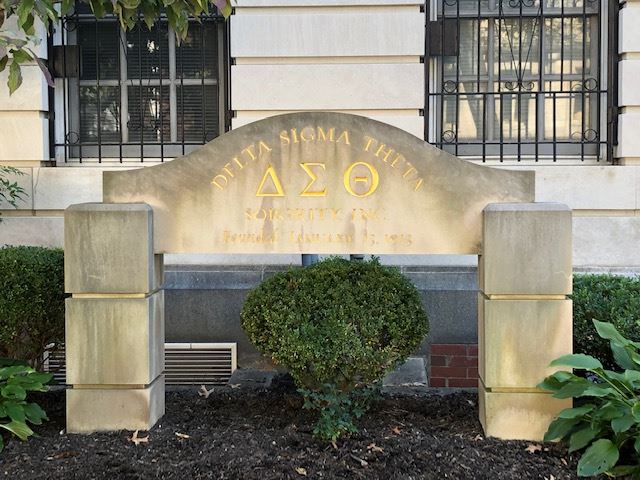 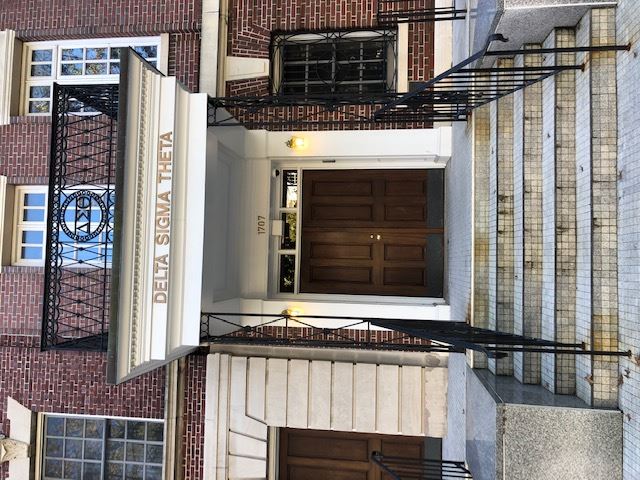 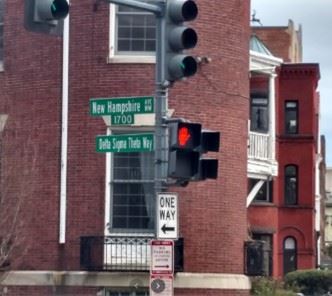 |
Delta Sigma Theta Sorority, Incorporated. is a private, not-for-profit organization whose purpose is to provide assistance and support through established programs in local communities throughout the world. The sorority currently has 1,000 collegiate and alumnae chapters located in the United States, Canada, Japan (Tokyo and Okinawa), Germany, the Virgin Islands, Bermuda, the Bahamas, Jamaica, and the Republic of Korea.
The house was built by the Potomac Realty Company of New Jersey in 1906 – a major developer in DC at the turn of the century. The property has four stories with a wide, twenty-five foot front. It is built of light stone brick, and at the time of its construction was considered to be one of the best and most costly houses in the city.
The architects were Bruce, Price, De Sibour. In the early 1900s, Dupont Circle rivaled New York’s upper Fifth Avenue as the place for prominent and wealthy people to congregate, and it was the first time Washington had a concentration of people rich enough to define themselves by the homes they built. The wealthy found the appropriate symbol for their status in the Beaux Arts style, a style which De Sibour delivered repeatedly. His aristocratic credentials suited the mood of the times, not least because his father, Vicomte Gabriel de Sibour, was a direct descendent of French King Louis IX.
De Sibour delivered repeatedly. His aristocratic credentials suited the mood of the times, not least because his father, Vicomte Gabriel de Sibour, was a direct descendent of French King Louis IX.
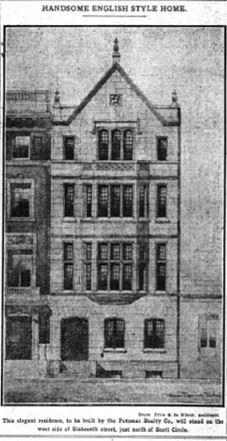
Jules de Sibour worked in Washington for some thirty years and was responsible for the design of the Folger Library, the Jefferson Hotel and the University Club. His design for 1746 Massachusetts Avenue NW, now the Embassy of Uzbekistan, and 2221 Kalorama Road NW, now the residence of the French Ambassador, are considered by many to be his finest works.
In the immediate neighborhood of 1707 New Hampshire NW, the Washington Post of May 31st, 1908 reported that he was also responsible for the design of grand houses along 16th street NW, also built by the Potomac Realty Company.
Early Residents
The Washington Times of Sunday, October 28th 1906, reported that the final details of construction were adapted to suit Mr. George W. Vanderbilt. “The house is of colonial design and has been specially planned for social purpose so that the new occupant may choose to entertain in the most elaborate manner.” It notes that the triangular lot at the corner of New Hampshire Avenue and 18th street NW had just been purchased by the Hon Perry Belmont, who later constructed the Belmont Mansion. Mr. Vanderbilt had previously maintained an apartment at 1709 New Hampshire Avenue.
It seemed that Mr. Vanderbilt did not remain at the address for long as on February 16th, 1907, the Washington Post reported that George Von L. Meyer, Postmaster General, leased the property. Mr. Meyer subsequently became secretary of the Navy Department. Again, there was a rapid turnover and in 1909, the house was purchased by Mrs. Ricketson, a socialite from Pittsburg.
The house was sold in 1916 to Reginald S. Huidekoper, a local attorney, who announced the intention to occupy the property as his home. By 1920, Mr. Huidekoper was Assistant District Attorney.
The Interior
The interior of 1707 New Hampshire Avenue NW has been renovated several times in pace with the growth of the organization. Delta Sigma Theta has purchased 1703, 1705, 1709, and 1711 New Hampshire Avenue NW as expansions for personnel, archival/display space, and mail processing areas. Additionally, meeting spaces were created and enlarged to accommodate the organization’s National Board of Directors.

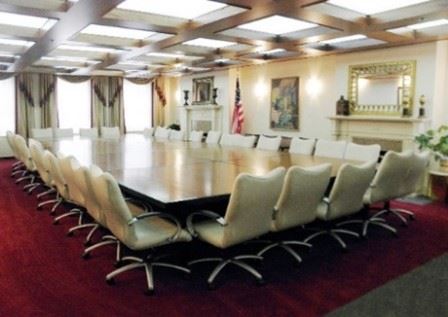

Delta Sigma Theta
Delta Sigma Theta Sorority, Incorporated was founded on January 13, 1913, by 22 collegiate women at Howard University to promote academic excellence and provide assistance to those in need. The Founders of Delta Sigma Theta envisioned an organization committed to sisterhood, scholarship, service, and addressing the social issues of the time. Since its founding, Delta Sigma Theta has become one of the preeminent service-based sororities, with more than 300,000 initiated members and over 1,000 chartered around the world.
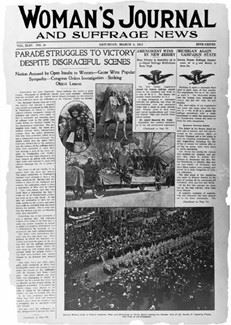 As a sisterhood comprised primarily of Black, college-educated women, the Sorority seriously considers the issues impacting the Black community and boldly confronts the challenges of African Americans and, hence, all Americans. Over the years, a wide range of programs addressing education, health, international development, and the strengthening of African American families have evolved. The major programs of the Sorority are based upon the Five-Point Programmatic Thrust: economic development, educational development, international awareness and involvement, physical and mental health, and political awareness and involvement.
As a sisterhood comprised primarily of Black, college-educated women, the Sorority seriously considers the issues impacting the Black community and boldly confronts the challenges of African Americans and, hence, all Americans. Over the years, a wide range of programs addressing education, health, international development, and the strengthening of African American families have evolved. The major programs of the Sorority are based upon the Five-Point Programmatic Thrust: economic development, educational development, international awareness and involvement, physical and mental health, and political awareness and involvement.
The first public act of Delta Sigma Theta as an established organization was participation in the Women's Suffrage March in Washington D.C. on March 3rd, 1913.
Members of the sorority who have made a distinctive contribution to political and social progress in the USA include:
- ·Sadie T. M. Alexander, (Truman Commission on Civil Rights)
- Brigadier General Hazel Johnson-Brown (first Black woman general in the US Army)
- Shirley Chisholm (first Black woman member of the U.S. Congress and first Black person and first woman to run as a major party candidate for the presidency)
- Carol Moseley Braun (first Black woman elected to the Senate)
- Stormie Forte (first black woman and first openly LGBTQ woman to serve on the Raleigh City Council)
- Frankie Muse Freeman (first woman appointed to the Civil Rights Commission by President Lyndon B. Johnson)
- Patricia Roberts Harris (first black woman to be appointed ambassador to a European country (Luxembourg) and to be appointed to a presidential cabinet post as Secretary of Housing and Urban Development (HUD) and later as Secretary of Health and Human Services)
- Alexis Herman (Secretary of Labor and a cabinet member in the administration of President Bill Clinton)
- Jewel Lafontant (first American woman to be admitted into the International Academy of Trial Lawyers; first female Deputy Solicitor General of the U.S.)
- Mary Church Terrell (first Black person chosen to represent the United States at the International Congress of Women and first Black woman to serve on the board of education of a major city).
- Barbara Watson (first African American woman to serve as chief of a State Department bureau, later becoming Assistant Secretary of State for Consular Affairs)
- Congresswoman Marcia Fudge (representing the 11th District of Ohio and unanimously elected by her colleagues to serve as Chairwoman of the Congressional Black Caucus)
- Loretta Lynch (first Black woman to be Attorney General)
- Althea T. L. Simmons (civil rights activist and attorney, head of the Washington D.C. branch of the NAACP)
The Neighborhood
Howard University has been a significant influence on the neighborhood, socially and politically. At the end of the 19th century, this block of New Hampshire Avenue NW was at the edge of the elegant, gilded age Dupont mansions. The grand houses on Massachusetts and New Hampshire avenues were owned by rich white families, but some of the neighboring blocks offered accommodation to some freed slaves and, towards the end of the century, Howard University graduates newly entering the professions.
For example, the north side of the 1700 block of R street, just a few steps away, accommodated C.C. McKinney, born in South Carolina in 1832, and his son Christopher Jr. who was an active organist and choir director in prominent African American churches including Shiloh Baptist Church and the Second Baptist Church. Christopher Jr. later worked as a copy clerk in the Department of the Navy to supplement his income as a musician.
Henry Piper, a messenger for the Treasury Department also lived in that block with his wife Emma and their 13 children. During the “Great Revival” of 1858, Mr. Piper joined the Fifteenth Street Presbyterian Church. With a prominent and active African American congregation, the church played a significant role in the struggle for freedom, civil rights, as well as the founding of educational institutions. Mr. Piper became one of the city’s earliest African American political activists and elected officials. Shortly after the Civil War, he joined the Union League of America, becoming its president in 1867. Two years later, he was elected an alderman to the city government’s common council. At that time, the DC government consisted of a mayor and an eight-member board of aldermen, a 12-member common council, and a mayor elected by both the aldermen and the common council. Mr. Piper became one of the council’s most outspoken advocates of racial equality in schools and public services.
In 1881, just around the corner in the 1700 block of 17th street NW, Richard T. Moss purchased a house. He had attended Howard University Preparatory School, and Howard University, graduating in 1876 at the age of 20 with B.A. He was the class salutatorian. He began teaching, and by 1879 was teaching the fifth grade at the Mott School, eventually becoming the school’s principal.
Nearby 1708 S Street, NW has been the home of the Washington DC Alumni Chapter, Kappa Alpha Psi Fraternity, Inc. since June 4, 1949. Kappa Alpha Psi Fraternity Inc., was founded on the campus of Indiana University Bloomington as Kappa Alpha Nu on January 5, 1911. The fraternity established its chapter at Howard University in 1920.